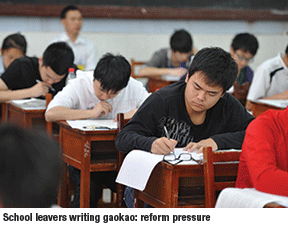 CHINA’S INFAMOUS UNIVERSITY ENTRANCE exam, known as the gaokao has long been subject to criticism. Admissions are based solely on the points scored in one exam, and the need for rote memorisation does little to foster creative minds. Now Beijing has taken its first tentative steps towards reforming the system.
CHINA’S INFAMOUS UNIVERSITY ENTRANCE exam, known as the gaokao has long been subject to criticism. Admissions are based solely on the points scored in one exam, and the need for rote memorisation does little to foster creative minds. Now Beijing has taken its first tentative steps towards reforming the system.
Last December it announced that the English-language part of the test can be taken several times, with the best score counting. More significantly, it said it would move towards an evaluation process where the test did not make up 100 percent of the score, and would include more subjective assessments of, for instance, extra-curricular activities. Details are expected this year.
Many see these reforms as long overdue. But some educators claim a move away from a straightforward points-based system will harm those who most need help getting into university: students from poorer, rural areas.
China’s elite universities already resemble their Western (and Indian) counterparts in one respect: most students are from relatively well-off backgrounds. In the 1970s, 50 percent of freshmen at the top-ranked Tsinghua University, alma mater of China’s president, Xi Jinping, were from poorer, rural areas, according to Yang Dongping of the Beijing Institute of Technology. In 2010 that figure was down to 17 percent. Tan Wufeng, who teaches communications at Tsinghua, says she was shocked to find her freshman classes this year didn’t contain a single student from rural China.
There are several reasons. Urban education is better financed. In Beijing in 2011, annual (government) expenditure per child in primary school was nearly 20,000 yuan (Rs. 200,000) compared with just 3,000 yuan in Henan, a poorer province in central China. Corruption and guanxi, or connections, also play their part. Many of the best high schools, even in small towns, are full of the children of local officials. Some students are admitted to college because of who they are or whom they bribe. In November an admissions officer at Renmin University, an elite Beijing college, was detained as he tried to flee to Canada after allegedly taking millions of yuan in bribes.
Geography counts, too. Universities set quotas for the number of students they will admit from a certain province. To land one of the few spots available, students from the countryside must score as high on the gaokao as their urban peers, in spite of their often more basic high-school education. For this academic year, Tsinghua admitted fewer than 200 students from Henan, which has a local population of 100 million, says Shi Yigong, a professor at the university, who is an advocate for retaining the gaokao. By contrast, at least 300 students were admitted from Beijing, which has a local population of only 13 million.
As education has become more competitive, it has also become more commercialised. In big cities wealthier students have better access to private tutors, as well as opportunity to study abroad and undertake helpful extra-curricular activities. The Chinese government is trying to tackle the problem by requiring universities to increase quotas for rural students.
But Shi is still worried that gaokao reform will end up benefiting the elite. He says test-based admission criteria may not be perfect, but at least they provide more of a level playing-field to allow clever children from poor areas — such as himself — a chance of success. It is “the fairest system” for China at the moment, he says.
(Excerpted and adapted from The Economist)



























